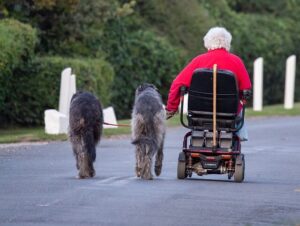The Therapeutic Power of Animals

The love and companionship provided by pets lures many Americans to continually have pets as part of their families. A 2019-2020 survey by the American Pet Products Manufacturers Association indicates that 67 percent of American households have pets. Research has shown that pets also play a therapeutic role in the lives of their owners. Pet therapy also benefits the developmentally and physically disabled; those with mental, emotional and psychological disorders; prisoners and at-risk youths; elderly people; cardiac patients; and the terminally ill.
Pets are always encouraging us to improve our emotional and physical health by providing us with unconditional affection and friendship. We are given a sense of purpose that often defeats loneliness and isolation. Our pets teach us about responsibility, loyalty, empathy and sharing as well. These qualities are especially essential to a child’s healthy development. Walking, playing, brushing and even petting increases our physical activity which strengthens the heart, slows the loss of bone tissue and improves circulation.

A study conducted at the University of California Los Angeles showed that many stress-induced aches and pains are lessened and pet owners require less medical care. Combining all these qualities can add years to the owners’ lives. Doing fun activities often stimulate individuals with low motivation. All these benefits can be achieved simply through owning the pet best suited for your lifestyle – a dog, cat, rabbit, bird or even fish.
In today’s society, pets can aid in the treatment of illnesses. Studies show that heart patients can actually live longer if they own a pet – more so than a spouse or friend. The presence of a pet can be very calming and comforting, therefore reducing a person’s risk of developing angina. Their companionship aids in lowering blood pressure and cholesterol levels which, when tests show high levels, can lead to cardiac arrest. Not only are they therapeutic, but pets can be a form of preventive medicine, too.
People who are terminally ill often find comfort from focusing attention on a pet. By bringing out our nurturing instincts, a pet can make us feel safe and accepted. In most cases, the need to take care of their pet gives a reason for living to many terminally ill patients, which can result in prolonging their life span. If the patient has a pet, they feel needed and responsible. These feelings stimulate the survival impulse.
Animals can sense the needs and respond to people with mental illness in ways a therapist cannot. Pet therapy helps to build a rapport with the mentally ill patient and their therapist. The therapist becomes viewed as “safer” when the patient sees the therapist interacting with a pet. A patient with a mental or psychological disorder feels that a pet listens and understands. This makes the emotionally ill and the mentally ill feel needed and significant. They then are able to rebuild their capability to trust other human beings. In turn, the anxiety of feeling alone and unworthy is lifted.

Horses provide a variety of ways to assist the physically handicapped. Therapeutic riding can improve posture, balance, mobility, and function for people who are diagnosed with cerebral palsy, muscular dystrophy, and diminished motor control in general. People who are confined to a wheelchair typically gain a new independence and mobility on the back of a horse. A horse’s rhythmic gait can stimulate the rider’s nerves and the exercise increases mobility for those that have a physical disability. Occasionally, these riders are able to participate in riding competitions. This increases the disabled riders’ ability to perform daily tasks in their non-riding lives.
Prisoners, juvenile delinquents and at-risk youth learn responsibility and trust when pets are used as part of their rehabilitation. The animals are nonjudgmental and show unconditional acceptance and love which brings out positive qualities almost effortlessly, for youths in particular. Pets are brought into prisons and juvenile detention centers to teach responsibility, trust, confidence and new skills. By becoming responsible for the welfare of another living being, these men, women and children develop a new outlook on life. Animals are taken to these facilities from humane shelters to be bathed and groomed by inmates and residents. When the animals are returned clean and happier, people living in these facilities gain an improved sense of self-esteem and self-worth. Their interaction with the animals gives optimistic attitudes that can lead to quicker rehabilitation for prisoners, juvenile delinquents and at-risk youth.
There is an abundance of advantages to an elderly person provided by a pet – specifically a dog. It is becoming more common for retirement communities, independent living communities and nursing homes to be pet-friendly and even encourage residents to have pets. Elderly people are more physically active from daily dog walks and are stimulated to get out of bed every morning to care for the dog. Loneliness and isolation ranks the highest among the elderly who are widowed or left in nursing homes. Walking the dog aids in eliminating loneliness by the elderly dog owner being put in contact with the rest of the world while out with the dog. When the family does not need their care anymore, a dog makes an elderly person feel needed and gives them a sense of purpose. A sense of self is restored and enhanced by the love they give a dog being returned to them.
The relaxing, comforting effect of touch may influence pet owners physiologically due to having different personality traits than people who do not own pets. Speechless communication, simply watching a fish or a bird or stroking a dog or cat is an antidote for negativity. Whether a dog, cat, fish, bird or horse, pets are indeed wonderful companions and all share the same therapeutic rewards to us. These pets have much to give with the simple payment of love.
